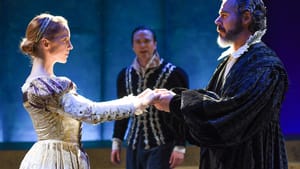Stay in the Loop
BSR publishes on a weekly schedule, with an email newsletter every Wednesday and Thursday morning. There’s no paywall, and subscribing is always free.
No Heart Unbroken
Quintessence Theatre Group presents John Ford's 'The Broken Heart'

The second half of Quintessence Theatre Group's "Love and Longing Repertory" overflows with love thwarted by politics. As much as director Alexander Burns's production of Shakespeare’s Love's Labor's Lost celebrates romance, John Ford's The Broken Heart reveals the despair and violence caused by love obstructed.
Ford's 1633 play -- reportedly receiving its professional Philadelphia premiere 384 years after its London debut -- is seldom performed, but Burns's clear, intense, and urgent production makes a case for seeing it more often.
Courting intrigue
Set in ancient Greece -- though sumptuously costumed in Jacobean finery by Jane Casanave -- the story's 19 characters at first make following each a challenge, but they emerge clearly as the story races ahead. Josh Carpenter plays Orgilus, who loves Penthea (Mattie Hawkinson). Her brother Ithocles (Daniel Miller) instead arranges for Penthea to marry Bassanes (Gregory Isaac). He tells his father Crotolon (John Basiulis) he intends to make peace with insanely jealous Bassanes, but disguises himself as a religious student to see Penthea secretly.
In political situations where every relationship becomes a negotiated treaty, few find happiness. Orgilus's sister Euphrania (Kristin Devine) agrees to marry only if her brother and father approve her choice. Amyclas, King of Sparta (John Williams), arranges for daughter Calantha (Ebony Pullman) to marry Nearchus, Prince of Argos (Lee Cortopassi), but Ithocles falls in love with her.
Any ear adjusted to Shakespeare will find Ford's dialogue familiar. Burns uses David Sexton's specific lighting to clarify asides to the audience, which sits on three sides of the same platform used in Love's Labor's Lost (minus its cheery grass). Sexton again uses a palette’s worth of color for striking dramatic effects. Emotions are big, and starkly portrayed in word and action; when Orgilus complains, "Love, thou art full of mystery!" his anguish is palpable.
"Revenge proves its own executioner"
This drama builds to the violent conclusion audiences expected in Ford's time. Ian Rose embraces the challenge with inventive fight choreography. Burns stages the climactic scene in the Sedgwick Theater's cavernous lobby after a confrontation leaves the stage slick with retribution. Despite the problems of audience relocating and dialogue echoing on stone walls, it's a bold move. In the play's final 20 minutes, we're participants, guests at a royal wedding interrupted by revelations, confessions, and carnage, plus a celebratory dance choreographed by Janet Pilla Marini. As with Love's Labor's Lost, the story is capped with hauntingly solemn and beautiful song (by Steven Cahill, who also provides filmlike underscoring).
Love's Labor's Lost and The Broken Heart show that these 400-year-old plays not only offer timeless wisdom and insight, but remain fresh and engrossing in creative, strongly acted productions. The can be enjoyed on the same day on two Saturdays, April 8 and 15, and two Wednesdays, April 5 and 19. They deserve to be seen.
What, When, Where
The Broken Heart. By John Ford; Alexander Burns directed. Quintessence Theatre Group. Through April 23, 2017, at the Sedgwick Theater, 7317 Germantown Avenue, Philadelphia. (215) 987-4450 or quintessencetheatre.org.
Sign up for our newsletter
All of the week's new articles, all in one place. Sign up for the free weekly BSR newsletters, and don't miss a conversation.

 Mark Cofta
Mark Cofta